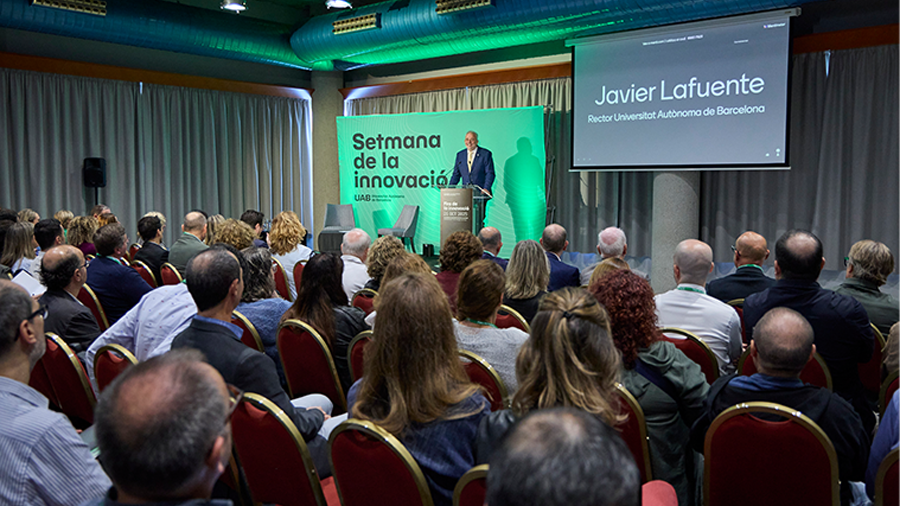Innovation Week brings together over 1000 participants and consolidates itself as a meeting point for research, companies and society
The third edition of Innovation Week at the UAB has brought together over 1000 professionals, including researchers, business people and entrepreneurs, who participated in a variety of activities held from 21 to 24 October. The event once again demonstrates the UAB's commitment to innovation and to working closely with the surrounding business and social networks.

Different activities, talks, awards and workshops were held over these four days. The Innovation Week was open to the entire campus community and to companies and entities in the area. More than 1000 people, including researchers, business people, students, entrepreneurs, and administrative staff, gathered on campus to explore collaborations and learn about the different innovation projects on campus.
Matchmaking for research groups and businesses
The Innovation Fair, held on Tuesday at the Exe Campus Hotel, was one of the highlights of the week and brought together more than 70 R&D groups, 10 start-ups, and 120 companies to connect the area's entire business, investor and research ecosystem, and promote the transfer of knowledge and technology with a social and economic return. During the day, more than 400 meetings were held between different institutional, business and academic actors to establish synergies and explore avenues for collaboration.
Carme Artigas, expert in Big Data and AI, emphasised in her presentation the importance of the ability to adapt to make artificial intelligence an ally in resolving the great challenges we face as a society, such as the Sustainable Development Goals. “These policies must ensure equal access to AI for all of society, ensuring its safety, veracity and responsible use,” she highlighted.
Without falling into catastrophism and highlighting all the opportunities, she also warned of the dangers posed by AI and the need to "create awareness" in our use of it, especially among the youngest population.
Visibility and awards for entrepreneurial projects
On the same Tuesday afternoon, the meeting "Emprèn UAB: Generating Spin-offs and Start-ups from the University" also took place, which brought together companies created at the University, students, entrepreneurs, entities and investors to exchange experiences. It included a round table on "early stage" investment and emerging UAB projects such as OPTICmizing, TECOUS, BrainMapp, and HeliCure, all of which made pitches and presented their innovative solutions in fields such as optical technology, biomedicine and digital health.
The day ended with the Eines Awards Gala, organised by the UAB Chair in Entrepreneurship and Social Innovation (CREIS) and held at the Ateneu de Cerdanyola del Vallès. Six social innovation projects received awards: the local award-winning projects (Índic, Refugi and Teixim Vincles) received a grant of 2,500 euros; and the regional and Catalan awards (La Crida Edison, BoscEscola and Etika Bikes) obtained a grant of 4,000 euros.
Arts, artificial intelligence and virtual reality
On Wednesday 22 October, innovation expanded into creative disciplines and immersive technologies. The UAB-Cruïlla Chair organised the "Arts, Innovation and Artificial Intelligence" conference, which explored the transformation of the artistic and cultural world through AI, including debates, concerts and demonstrations. In addition, Town-UAB was presented, a photorealistic digital urban environment inspired by the campus, created to train, test and validate AI models for autonomous driving.
That same day, two activities were also held that showed how virtual reality is transforming both health and university and research environments. The activity "Innovating in Health: Virtual and Immersive Reality in Primary Care", organised by the Jordi Gol Institute for Research in Primary Healthcare (IDIAPJGol), focused on how immersive technologies—such as virtual reality—can improve clinical practice, especially in the field of primary care and community health. The UAB Open Labs then proposed a tour of the uses of virtual reality in teaching, research, outreach and social innovation. The UAB Virtual Reality Community presented outstanding projects in areas such as veterinary medicine, digital humanities, and communication, showing how VR can improve the way we create, teach and transfer knowledge.
Fostering sustainable and female entrepreneurship
The last days of Innovation Week were intensely dedicated to entrepreneurship. On Thursday 23 October, the "Learn to Innovate Disruptively" session was held, a practical training aimed at students and entrepreneurs to develop groundbreaking ideas. Also on 23 October, the Barberà del Vallès City Council organised the BarbEmprèn 2025, a collaborative innovation day to promote sustainable entrepreneurship and the transition to a circular economy. Participants worked in a hackathon format to devise creative solutions to a real environmental impact challenge posed by a local company.
The week concluded on Friday 24 October with the Women's Science and Entrepreneurship conference at the UAB Theatre Hall. This activity highlighted the role of women in scientific research and entrepreneurship, with a large panel of speakers, such as Meritxell Bautista, executive president of MANIX Capital, CEO of Xarxalia, founder of Fibracat and co-founder of Ikonikas; Marta Padilla, former CTO of Holaluz and Allianz tech; Elisa Rodríguez, head of R&D at InBrain Neuroelectronics; Agnès Arbat, founder and CEO of Oxolife, winner of the European Commission's 2025 Woman Innovator Award; Txell Costa, founder of Txell Costa Group® and Costa Strategic Partners; and Marta Portalés, head of European Projects at Mobile World Capital Barcelona.